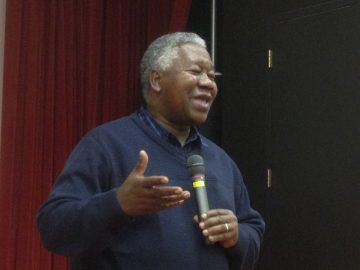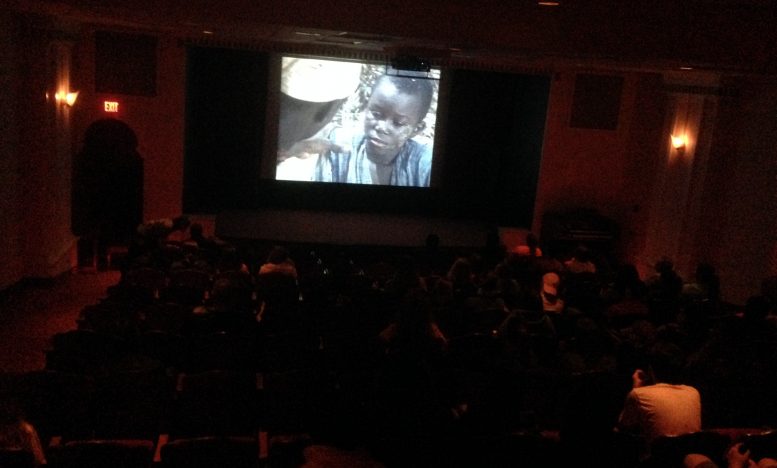By DAVID DUPONT
BG Independent News
Gaston J-M Kabore, a filmmaker from Burkina Faso, would like to see the waves of refugees fleeing Africa stay at home.
“If you teach the youth … not to leave their continent and go and die in the desert and the sea because they believe there’s Eldorado elsewhere, if they take the money they gather to make the risky trip, if they make it work where they are, they will do miracles,” he said.
They need to understand that over the ages, Africans have resolved their issues and can again. In the past Africans built civilizations and empires with sophisticated religions and rites, sculpture, dance, and music. The Mossi emperor still exists, without any civic power, but still commanding respect enough that he is called upon to mediate disputes.
But now there are psychological “sediments” undermining Africans’ belief in themselves.

Gaston J-M Kabore
Kabore, 67, has dedicated his career to telling the stories of his people. On Friday at noontime he will be the keynote at the Africana Studies Student Research Conference in the Bowen Thompson Student Union. His talk is free.
The filmmaker has been in residence on the Bowling Green State University campus this week, where all four of his feature films and his short philosophical film “2,000 Generations of Africans” have been screened.
Kabore started as a historian, beginning with studies in his homeland before traveling to Paris. In France he studied how Africans were depicted in illustrated magazines in the period following the 1885 Berlin Conference. At that conclave of European powers, leaders decided how they would conquer and divide Africa. When their forces met, Kabore said, they would stop.
That led to boundaries drawn without regard for natural features or tribal divisions. “This explains some of the drama we live with today.”
He wanted to study history, he said, because he was learning the history of Africans that “was being written exclusively by Europeans.”
He did not “feel the thoughts and conscious decision of the Africans no matter who they are.”
Studying those early 20th century magazines “you see all the sources of the stereotypes and prejudices.”
Those prejudices became almost part of the DNA of the French and other colonizing powers. “These things were meant preserve the interests of the government and the politicians.”
Kabore decided to go to film school to see how this dynamic played out in movies. A movie lover, he wanted to use cinematic language to relate the new history of Africans that was emerging at the time. Then Kabore realized “maybe it is as important to tell stories coming from our imaginations, all the myths and legends, the tales, created in Africa.”
The colonial period was traumatic. Africans were forbidden from speaking their own languages, were forbidden from practicing their own religions.
Kabore wanted to tell people they were not alone among humanity in suffering traumatic times, not just colonization, but the earlier period when Europeans kidnapped millions of people to put them to work as slaves to build other colonies.
He wanted to assure them they came from somewhere.
“I was expecting a kind of Renaissance,” he said. It has been a long time in coming. Like all people around the world, they have their conflicts and divisions, regional and economic with just a handful controlling most of the wealth.
South Africa’s liberation from apartheid has offered hope, he said.
But the battle takes place in the mind. Even now, he said, some African scholars repeat “the idiocy” they learned from Europeans.
Kabore’s weapons were his award-winning films, made between 1985 and 1997. In 2003 he created the Institut Imagine, a film school in Ouagadougou, the capital of Burkina Faso. It provides professional training in all aspects of filmmaking because “I believe cinema is able to play a fundamental role of the restoration of that self-confidence, self-esteem.” And that will lead, in turn, to the restoration of Africa.

